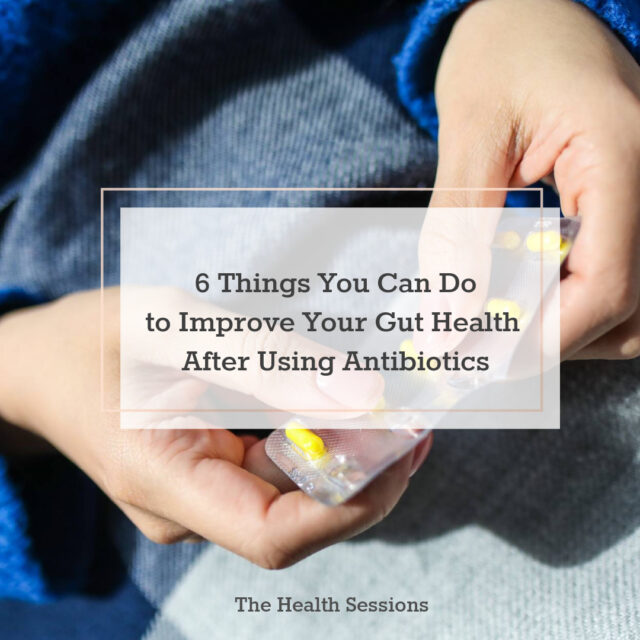Green Prescriptions: The Power of Therapeutic Gardens in Promoting Health

This article is written by Richard Lin.
Antibiotics are the most effective form of treatment for specific conditions. Unfortunately, a recent report from the Centers for Disease Control (CDC) determined that approximately 30% of antibiotic prescriptions are unnecessarily written each year . That’s 47 million in total! While overprescribing antibiotics might seem harmless, the overuse of these medications can have lasting effects on your overall health.
The purpose of antibiotics is to rid your body of bacteria strains that have become overabundant in the body. However, these medications also destroy healthy bacteria.
Without these microbes, your gut is a wide-open area prone to pathogens. These pathogens can overtake your gut microbiome and compromise your health. Let’s go over the potential dangers of these prescription drugs and how to improve your health using probiotics.
Our body hosts trillions of microscopic cells known as microbes. Microbes include living beings, such as yeast, fungi, viruses, and bacteria. Each one of these microscopic beings plays an invaluable role in a variety of physiological processes. The area in which they coexist inside of you is known as the gut microbiome.
One of the most abundant types of microbes are bacteria. There are over 500 species of stomach bacteria present in the human body. Most of our stomach bacteria coexist in the gut to help us remain active and healthy. Some of the most crucial tasks performed by gut bacteria include:
That’s a lot of ground to cover! Just one bacterial species can’t do all this work on their own. Instead, each bacterial species has a specialty. In their absence, the system might not run as smoothly.

Every bacterial species has a purpose in our internal ecosystem. Even Escherichia coli (E.coli), the bacteria strain synonymous with foodborne illnesses, helps your body produce Vitamin K and Vitamin B12 . However, E. coli is an opportunistic bacterial strain. If it sees a chance, such as an empty gut post-antibiotics, it will rapidly start to overtake the gut microbiome.
Our body relies on other gut bacteria to keep these overgrowths from happening. As bacteria levels for certain species taper off, different bacteria strains will step up to fill the void.
The gut microbiome must already compete with poor dietary choices, environmental toxins, and viral attacks. Over time, these health hurdles could deplete numbers of beneficial bacteria. For those who already have a compromised gut microbiome, a round of unneeded antibiotics can create an environment conducive to bacterial overgrowth.
Taking antibiotics can save a person’s life. Unfortunately, the aftermath of prescription antibiotics can leave the gut microbiome void of probiotic bacteria.
This unwanted side effect can have lasting implications after your antibiotic treatment. Here are some ways that a lack of bacterial diversity post-antibiotics might cause issues for your overall health.
Probiotic bacteria help us digest dietary fibers that our bodies can’t break down. These fibers are known as prebiotics. Prebiotics are found in a wide variety of plants, including chicory, onions, and artichokes.
Since probiotics are living beings, they must expel waste. Their waste comes in the form of metabolites. The most common metabolites produced by our stomach bacteria are short-chain fatty acids. Short-chain fatty acids act as electrical jolts that kickstart cellular processes. Epithelial cells that comprise our gut barrier heavily rely on short-chain fatty acids, especially butyrate and acetate.
A recent study involving infants found that the average child was low in common commensal bacteria, such as Faecalibacterium, Lachnospira, Rothia, and Veillonella. These gut bacteria are known to produce adequate amounts of acetate, a short-chain fatty acid that offers immune support to colon cells.

Approximately 80% of your immune system cells are located within the gut microbiome. This area is very close to our small intestine. This organ holds many pathogenic bacteria and toxins that would love to permeate the gut barrier into the microbiome.
The gut barrier has microscopic holes. These allow nutrients from our food to permeate from the small intestine to our bloodstream. Unfortunately, these holes tend to get larger as we get older. These issues are due to chronic inflammation caused by a lifetime of factors, including poor diet choices, long-term use of medications, or autoimmune diseases. Therefore, your immune system must always be on hand to stop these pathogens at the gate.
Our immune system cells and probiotic bacteria remain in constant contact. In fact, they can influence each other’s functions. If your gut microbiome doesn’t have probiotic bacteria, your immune system cells must fight off pathogens from your intestine alone. Without proper support, your body can become more susceptible to colds and viruses.
A recent study conducted by The Francis Crick Institute injected an influenza virus into mice teeming with healthy gut bacteria. Half of the mice were given antibiotics prior to the flu injection. 80% of the mice survived. This 80% included one-third of the mice who used antibiotics prior to being exposed to the flu. These results suggest that gut bacteria help protect the lungs from contracting a virus.
The overuse of antibiotics doesn’t just impact the person prescribed. It can cause an antibiotic resistance that can impact humanity as a whole. Bacteria can adapt for survival. Over time, pathogenic stomach bacteria can learn how to overcome antibiotic prescriptions.
These concerns are even more valid when we consider the overuse of antibiotics in the food industry. Many dairy farms give calves antibiotics for potential bacterial infections. The reason for this precautionary measure is that an infection is almost inevitable. Dairy cows are milked often, which can cause sores on their udders. In many instances, the milking is done by machines, which can cause further damage to the cow.
Antibiotics are also prevalent in our water supply. Humans have gotten in the habit of flushing pills down the toilet. Research shows that antibiotics are one of the many medications found in 80% of water samples in 30 states.

If you are concerned about using antibiotics, please talk to your doctor. There are many cases where antibiotics are the most viable option. Please listen to your doctor’s orders and follow the doses as prescribed.
There are a few things you can do to improve your gut health post-antibiotics. Discuss these ideas with your doctor.
Many of us avoid the doctor like a plague. So, we grin and bear discomfort in hopes it goes away. Don’t do that when you’re getting treated with antibiotics. Communicate stomach problems or illnesses to your doctor the months following antibiotic treatment. Identify any small issues before they become larger ones!
Bone broth is an excellent source of collagen and elastin. These two peptides help give our epithelial cells structure. They help clog up larger holes around the gut lining that leaves our bodies susceptible to pathogens. For optimal gut-healthy benefits, use bones from wild-caught fish or free-range animals. They won’t carry any pesticides or heavy metals used in factory farming. Also, make sure the packaging states “antibiotic-free” meat.
Your body needs probiotic bacteria to help replace the healthy bacteria being depleted by antibiotics. Eat probiotic-rich foods during and after antibiotic treatment.
There are many probiotic food sources, including yogurt, kimchi, pickles, and nato, and kraut. While kombucha can be excellent for someone with a diverse gut microbiome, this beverage might cause issues after a round of antibiotics. Kombucha is made with a lot of sugar that pathogenic bacteria love. In an empty gut microbiome, those sugars might entice bacteria to leave the intestine and take over the gut microbiome.

The only way to grow probiotics is to feed them. You must add more dietary fiber to your diet.
Make sure the fiber is gluten-free. Even if you don’t have Celiac Disease or a gluten sensitivity, consuming this protein after antibiotics can cause problems. Gluten triggers the body to secrete zonulin. Zonulin stimulates the tiny holes around our gut barrier, known as tight junctions. As a result, the holes dilate. This chain reaction allows toxins from the small intestine to permeate into the bloodstream.
The best way to fight off a bacterial infection post-antibiotics is to get educated on your gut microbiome. There are a growing number of microbiome testing companies in the health and wellness market. Consider trying an at-home gut test.
Collect a small sample from your toilet paper with one of the sterile swabs provided in the kit. Immerse the swab into a vial with preservative liquid and swirl. Dispose of the swab as you would a diaper. Seal the vial and ship it in the pre-addressed envelope back to the company.
A laboratory will use DNA sequencing to isolate the bacteria in your sample. Based on the abundance of each species, they can give you a detailed report on the expected ratios of each species in your gut microbiome.
This knowledge is important because each species has different dietary preferences. Knowing which gut bacteria are causing you discomfort can tell you which foods you should remove your diet to prevent an overgrowth.
Many people find support during and after antibiotics by using probiotic supplements. Please speak to your doctor first. You don’t want to take a probiotic that helps an already abundant species grow stronger.
Some gut test companies also have custom probiotic recommendations. They can offer you a tailored probiotic based on the actual bacteria in your gut microbiome.
Antibiotics can save lives. The overuse of antibiotics can harm them. We must be more proactive with our health to prevent our own illnesses and herd antibiotic resistance.
Talk to your doctor about potential alternatives before accepting an antibiotic prescription. Consider getting a second opinion if you believe there are other viable options available. If you need antibiotics, consider your recovery plan. A lot of this process will involve dietary changes.
Start incorporating probiotic and prebiotic foods into your diet. Purchase antibiotic-free meat to create a gut-healing bone broth. Lastly, consider getting your gut tested. Get educated about which bacteria live in your gut microbiome. From there, you can make an informed decision for inoculating probiotic bacteria back into your body.
Author Bio: Richard Lin dedicated his life to spreading the message about the importance of gut health when a round of antibiotics wiped out all the bacteria in his gut, leaving him hospitalized. Doctors couldn’t figure out what was wrong with Richard, so he did the research himself and discovered the microbiome. Richard reclaimed his health with probiotic bacteria. Now, he’s partnered with scientists and doctors from MIT, Harvard, and Stanford to bring gut testing to homes across the globe. Richard is the CEO of Thryve DNA Testing. Their tests provide in-depth insights on the bacteria in your gut, a personalized probiotic recommendation, and a tailored diet plan. Nobody should wonder about their health as Richard did. Now you don’t have to!
If you enjoyed reading this article, you might also like: